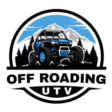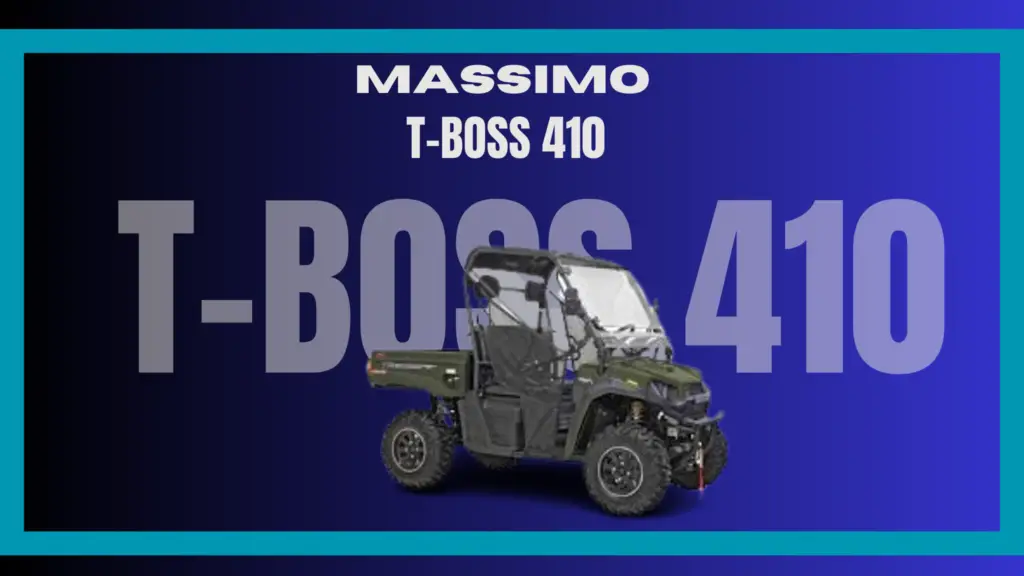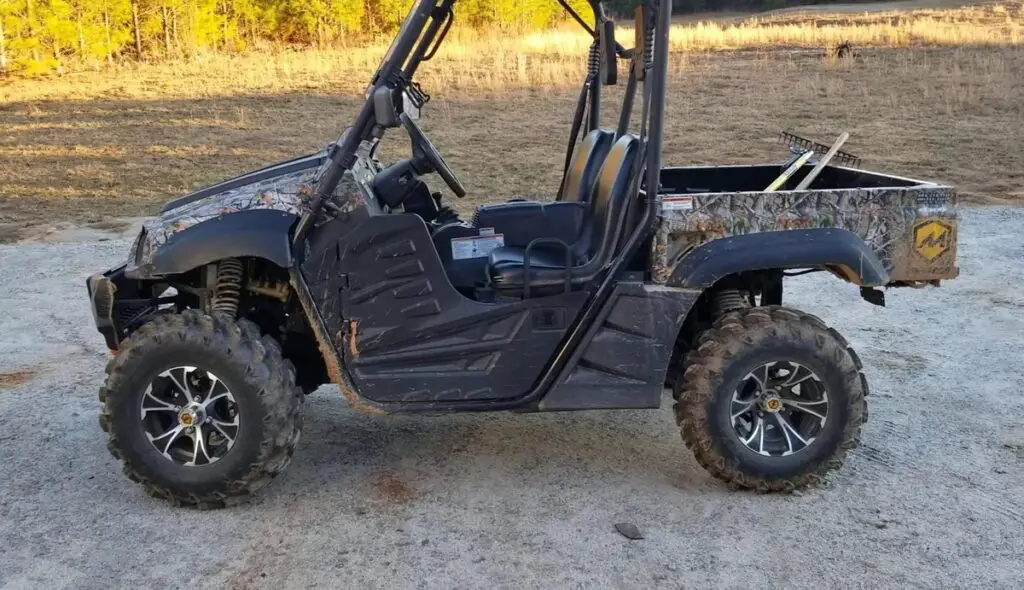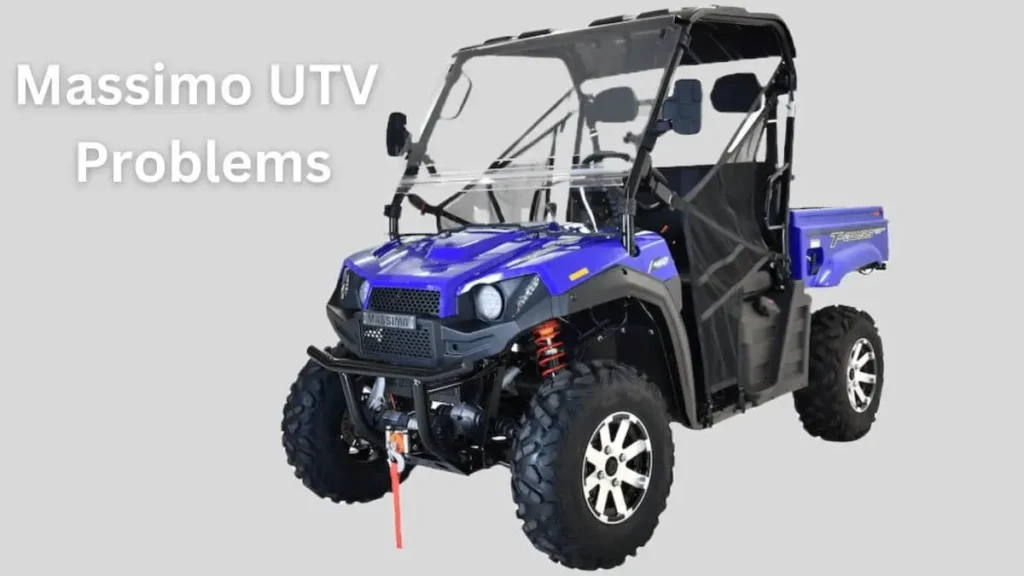Massimo T-Boss 410 UTV is great for hobby farming, hauling debris, and moving firewood, thanks to its 1000 lb towing capacity and hydraulic-assisted dump bed, as mentioned in Massimo T-Boss 410 review Reddit threads and Massimo T-Boss 410 review 2021 posts.
However, Massimo 410 is poor with heavy workloads or extreme conditions, with common Massimo UTV problems including poor gear shifting, overheating, and warranty issues reported across Massimo T-Boss 410 review 2020 and Massimo T-Boss 410 review 2022 feedback. Key Massimo T-Boss 410 specs include a 352cc, 25.5 HP liquid-cooled engine, 9.75 inches of ground clearance, a 6.9-gallon fuel tank, a lightweight 1087 lbs dry weight, and an automatic CVT transmission.
Its standout features are the selectable 4WD, a 3000 lb winch, a diamond-plated dump bed, LED lights, and hydraulic disc brakes, making it versatile for casual users. Massimo T-boss 410 costs between $10,000 and $12,000, it’s a budget-friendly choice compared to competitors.
This article covers real owner experiences from Tractor Supply, Walmart and Amazon, performance tests in scenarios like trail riding and snow plowing, detailed specifications, common issues such as starting failures, and practical solutions to help you decide if the Massimo T-Boss 410 EFI 4WD UTV is worth it for you.
What Do Real Owners Say About The Massimo T-Boss 410?
Real owners say that the Massimo T-Boss 410 hauls 1000 lbs well but faces overheating and gear issues. There are 200+ real user reviews on Tractor Supply, Walmart, Lowe’s, Amazon, and UTV forums, and their combined average rating is 3.5 stars out of 5. From the 15 most liked real owner reviews for Massimo T Boss 410, 53.33% of the user experiences were good, and 46.67% of the reviews were bad.
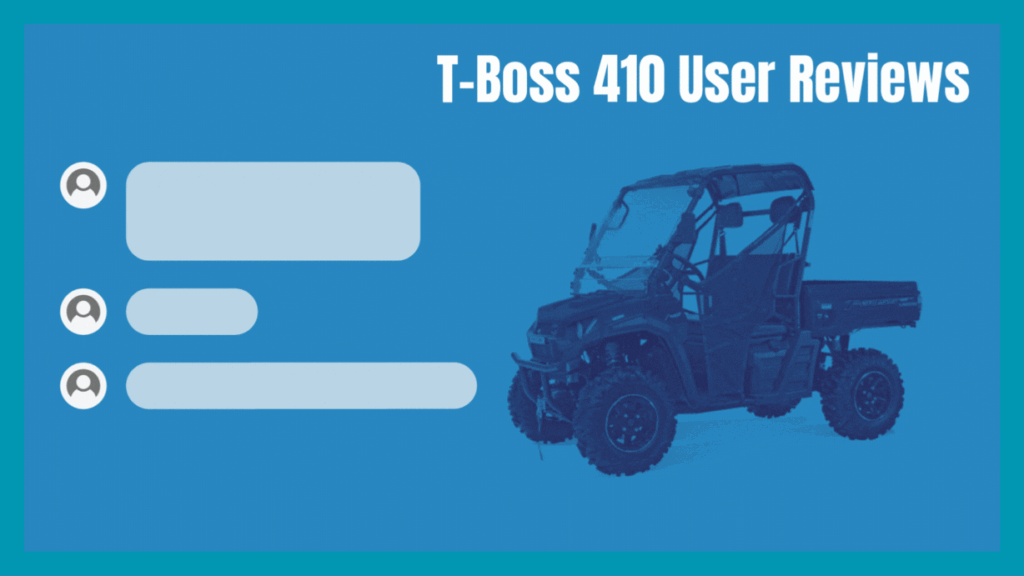
The bad user experiences include poor gear shifting, overheating, total breakdown after very little use, missing key components, faulty product delivery. These negative experiences are often made worse by warranty and service challenges.
Good massimo t-boss 410 reviews suggest that massimo t-boss 410 is good for small farms, hobby farming, hauling debris, carrying mail, moving firewood, with good customer service and features.
| Platform | Rating |
| Tractorsupply | 4 Star |
| Walmart | 3.8 star |
| Lowe’s | 2.8 star |
| Amazon | 3.3 Star |
Are There Any Consumer Reports Or Third-Party Opinions On The T-Boss 410?
There are no dedicated Massimo T-boss 410 reviews or consumer reports. Massimo t boss customer reviews and user experiences tell that the vehicle has a rugged design with standard features, including a 25.5 HP EFI engine, in-cabin selectable 4WD, a hydraulic-assisted dump bed, and a 3,000 lb winch, which makes it value for money.
But according to bad user experiences, Massimo t-boss 410 is bad for its customer service, parts availability which questions the reliability of the brand.
Is The Massimo T-Boss 410 Worth It For Different Use-Cases?
Considering the pros and cons, Massimo t boss 410 is worth the price for different use cases. Massimo T-Boss UTV is good for carrying materials as it has a dump bed capacity of 1000 pounds.
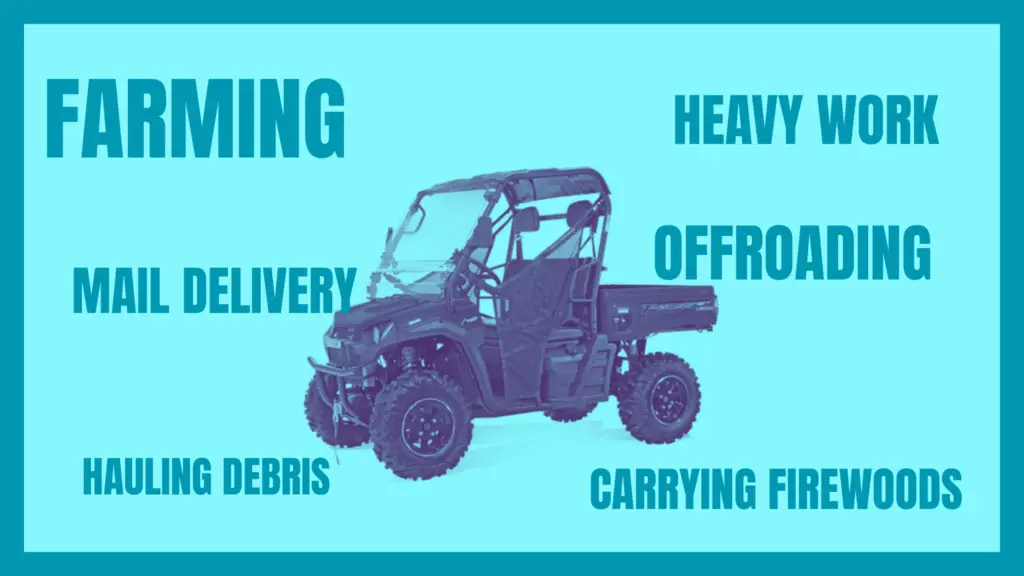
The Massimo T-Boss 410 is worth it for farm use, work at the ranch, and the construction sites due to features such as a dump bed, 9.75-inch ground clearance. The 4X4 vehicle is good for trail riding with friends and hunting, with a powerful 352cc engine and 25-inch tires. It comes with a plow; thus, it can help you out with snow plowing.
Other standard features of suspension, winch, headlights, chassis and digital dashboard make it more versatile. If you are struggling to afford a new Massimo t boss 410, a second-hand model will still be worth it if you get the best deals in the used UTV market. The best use cases of Massimo T boss 410 include farming, ranch work, carrying heavy loads, snow plowing, trail riding and hunting.
What Are The Best Conditions To Test The T-Boss 410’s Capabilities?
The best conditions to test the T-Boss 410’s capabilities are cold weather, night riding on off-road terrain, trail riding, hill climbs, and rocky terrains. Riding Massimo T-Boss 410 in snowy/cold weather is a very good test for evaluating Massimo T-boss battery reliability and tire grip.
The uneven terrains are good for testing the suspension and comfort level of the Massimo T-Boss 410. Hill climbs and trail riding are good for testing the Massimo t-boss 410 engine power. To test the Massimo t-boss 410’s payload and towing capacity, load the vehicle with the woods, tools, cargo, hay, etc., to its full capacity.
The farm use test can be performed by testing Massimo T-boss 410 on uneven terrain, hill climbing test and payload capacity.
Here are Massimo t-boss 410 tests and their conditions.
| Test Condition | Test For |
| Cold Weather Test/ Snowy terrain test | Battery reliability and Tire grip |
| Rocky/Uneven Terrain test | Suspension and Comfort level |
| Hill climbs and Trail riding test | Engine power, Overall performance |
| Payload and Towing capacity test | Carrying capacity, Cargo Bed Capacity |
How Does The T-Boss 410 Perform In Real-World Scenarios And User Feedback?
Massimo t-boss 410 real-world performance is worth it in the farming and heavy work sites. The vehicle is compact beginner friendly. The speed is 40 miles per hour in a few minutes. The design is rugged and works fine on uneven terrain. The dump bed is diamond plated; it can carry loads of material.
The dump bed needs little effort to dump the materials. The seating is comfortable for two people. The digital dash shows the details, and the buttons for winch, 2wd, and 4wd are on the side of the dash. The following are some videos showing the real-world performance of the Massimo-t-boss 410.
To get the real user feedback, the user forum discussions about Massimo t-boss 410 are a good place. The user discussions involve the different use cases, problems and queries of the vehicle. The reliability of the Massimo T-boss 410 is high, and several users recommended it.
How Reliable Is The Massimo T-Boss 410 In Cold Weather Or Snow Plowing?
The Massimo T-Boss 410 is reliable for cold weather and snow plowing in moderate conditions but not in extreme conditions. It can do snow plowing well with a proper attachment. The Massimo t-boss 410 has the 25.5 HP EFI engine to power snow plowing and 4WD drive with a compatible 60-inch snowplow to handle the snowy terrain.
Though the vehicle has a rugged design, on the heavy and wet snow, it can struggle to ride as it is a lightweight UTV. Users have reported issues with Massimo-t boss performance in extremely cold weather. A user on the UTV board has reported that the snowplow breaks and there are better options for snow plowing, like Kawasaki and Polaris.
What Are the Key Performance Features of The T-Boss 410?
The key performance features of T-boss 410 include a 352cc 25.5hp liquid-cooled engine, 1000 lbs of towing capacity, on-demand 2wd 4wd, Hydraulic disc brakes with drilled and slotted rotors, and single-piston calipers.
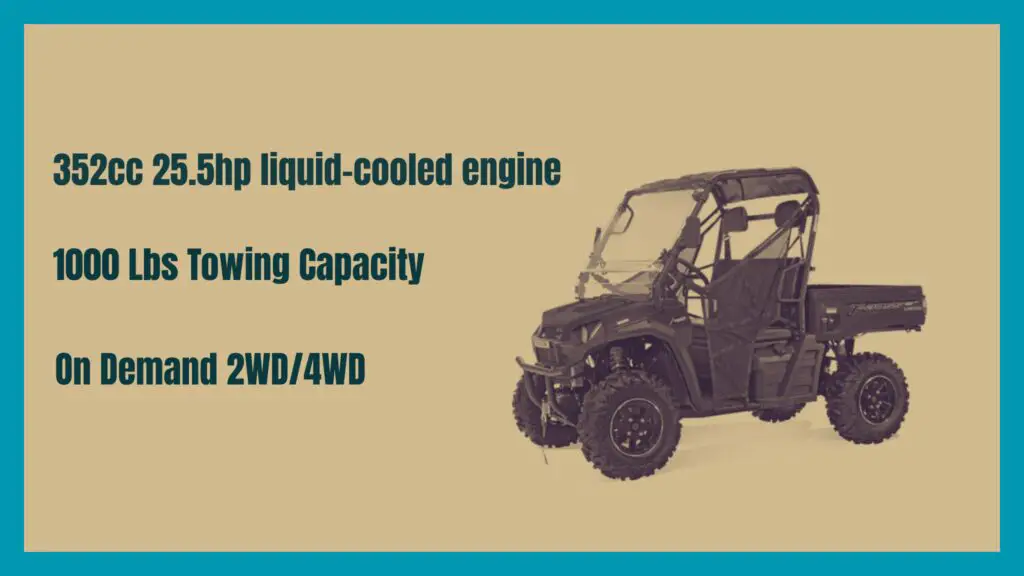
What Are The Official Specifications Of The Massimo T-Boss 410?
The official specifications of the Massimo-T Boss 410 include its dimension specifications, engine features, chassis specs, and additional features.
The Massimo T-Boss is a 54-inch wide compact UTV with a wheelbase of 72 inches and 9.75-inch ground clearance. Massimo T-boss is 1087 lbs in weight, which puts it in the lightweight category UTV.
Massimo T-Boss 410 has a four-stroke SOHC single cylinder EFI engine with 352cc displacement and 25.5 horsepower. The engine is liquid cooled. The T-Boss 410 transmission is automatic with CVT and has R/N/L/H modes. The on demand 2WD/4WD helps to navigate terrains well.
The Massimo T-Boss chassis has Hydraulic disc brakes in the front and rear with drilled and slotted rotors and single-piston calipers. Massimo T-Boss 410 comes with additional features which include the LED lights, arm guards, fender flares, and side mirrors.
| Specification | Details |
|---|---|
| Vehicle Size (L x W x H) | 105.5 in x 54 in x 74 in |
| Wheelbase | 72 in |
| Ground Clearance | 9.75 in |
| Towing Capacity | 1000 lbs |
| Fuel Capacity | 6.9 gallons |
| Seat Height | 33.5 in |
| Dry Weight | 1087 lbs |
| Engine Type | Four-Stroke SOHC Single Cylinder |
| Displacement | 352cc |
| Horsepower | 25.5 HP |
| Cooling | Liquid Cooled |
| Transmission/Final Drive | Automatic CVT R/N/L/H |
| Drive System | On-Demand 2WD/4WD |
| Fuel System | Electronic Fuel Injection (EFI) |
| Front Brakes | Hydraulic Disc Brakes with Drilled & Slotted Rotors, Single Piston Calipers |
| Rear Brakes | Hydraulic Disc Brakes with Drilled & Slotted Rotors, Single Piston Calipers |
What Is The Top Speed Of The Massimo T-Boss 410, And How Does It Handle Off-Road?
Massimo T-Boss 410’s top speed is 36 mph, as per official sources. The users have reported that Massimo T-Boss 410 has reached a top speed of 40 miles per hour also. With such speed, the Massimo T-Boss handles the off-road well without any rollover.
What Are the Key Dimensions and Capacities (Cargo, Towing) Of The T-Boss 410?
The Massimo T-Boss is a 54-inch wide compact UTV with a wheelbase of 72 inches and 9.75-inch ground clearance. Massimo T-boss is 1087 lbs in weight which puts it in the lightweight category UTV. The Massimo T-Boss 410’s towing capacity is 1000 lbs with a diamond-plated dump bed.
| Specification | Details |
|---|---|
| Vehicle Size (L x W x H) | 105.5 in x 54 in x 74 in |
| Wheelbase | 72 in |
| Ground Clearance | 9.75 in |
| Towing Capacity | 1000 lbs |
| Fuel Capacity | 6.9 gallons |
| Seat Height | 33.5 in |
| Dry Weight | 1087 lbs |
How Powerful Is The Massimo T-Boss 410 Engine?
Massimo T-Boss 410 is powerful enough to carry your farm loads, drive over uneven, hilly, and snowy terrains. Massimo T-Boss 410 has a four-stroke SOHC single cylinder EFI engine with 352cc displacement and 25.5 horsepower. The engine is liquid cooled. The T-Boss 410 transmission is automatic with CVT and has R/N/L/H modes. The on demand 2WD/4WD helps to navigate terrains well.
| Specification | Details |
|---|---|
| Engine Type | Four-Stroke SOHC Single Cylinder |
| Displacement | 352cc |
| Horsepower | 25.5 HP |
| Cooling | Liquid Cooled |
| Transmission/Final Drive | Automatic CVT R/N/L/H |
| Drive System | On-Demand 2WD/4WD |
| Fuel System | Electronic Fuel Injection (EFI) |
Are Massimo T-Boss 410 Brakes Reliable?
The Massimo T-Boss is reliable for the usual use cases. Massimo T-boss has hydraulic disc brakes in the front and rear with drilled and slotted rotors and single-piston calipers. There are not such concerns about brakes by users on the forums and online portals. However, some users have shown concerns about the overall quality of Massimo and its service.
That does not link directly to the vehicle but raises concerns for long-term use. Considering all the user reviews and feedback, it is definite that the Massimo t-boss brakes are reliable for regular use without much concern, however, its long-term reliability is a function of the maintenance and regular care of the vehicle.
How Well Does The T-Boss 410 Tow Or Haul Cargo?
The T-boss 410 tow and haul cargo well for a property owner or casual user needing to move up to 1,000 pounds. However, very heavy loads over 1000 pounds can be extreme for it. The dump bed is diamond plated which is good for carrying rough stuff. Massimo T-boss 410 is good for fetching mail, moving firewood, and hauling plant debris.
The users have praised the towing and hauling capabilities of the vehicle, which they have tested for months, and had no issues with it. The included 3,000-pound winch is a bonus, with users mentioning its usefulness for pulling fallen trees or assisting with stuck loads, as mentioned in a Tractor Supply review.
What Accessories And Upgrades Are Commonly Added To The T-Boss 410?
The commonly added accessories to the T-boss 410 are trailer hitch, LED light bars, cargo nets, side nets, storage box, seat covers, and Bluetooth speakers. The common upgrades added to the T-Boss 410 are suspension upgrades, tire upgrades, exhaust kit upgrades, and clutch kit.
Here is a complete guide on massimo accessories and upgrades.
| Category | Accessory/Upgrade | Purpose |
| Utility/Towing | Trailer Hitch/Receiver | Easier towing of trailers or carts |
| Higher-Capacity Winch (3,500–4,500 lbs) | Heavy recovery (e.g., pulling trees) | |
| Storage | Bed Extender/Cargo Net | Secures loose items in 400-lb dump bed |
| Storage Box (Under-Seat or Bed) | Weatherproof, lockable storage | |
| Comfort | Full Enclosure Kit/Soft Doors | Protection from dust, rain, and wind |
| Seat Covers/Padded Inserts | Improved comfort for long rides | |
| Suspension Upgrade (Shocks/Lift Kit) | Better ride, increased clearance (1.5–2 in) | |
| Off-Road Performance | Tire Upgrade (26–27 in, Mud/Trail) | Enhanced traction in mud or rough trails |
| Alloy Wheels | Durability and aesthetics | |
| LED Light Bar/Pod Lights | Night visibility for work or trails | |
| Recreation | Bluetooth Soundbar/Speakers | Audio for trail riding or leisure |
| Specialty | Gun Rack | Hunting or rural utility |
| Camo Wrap | Aesthetic/hunting camouflage | |
| Performance | Air Intake Snorkel | Engine breathing in water/mud |
| Exhaust Kit | Improved sound or slight power gain | |
| ECU Tune/Clutch Kit | Better low-end torque for towing |
What Are The Most Common Problems Reported With The Massimo T-Boss 410?
The most common problem with the Massimo T-boss 410 is that it dies mid-run. and then didn’t start. This issue is associated with 10+ factors; users have reported that this issue has occurred to their new vehicles. The reason for these issues arises from ignition coil malfunction, P0351 error, weak spark causing stalling of vehicle, and overheating issue.
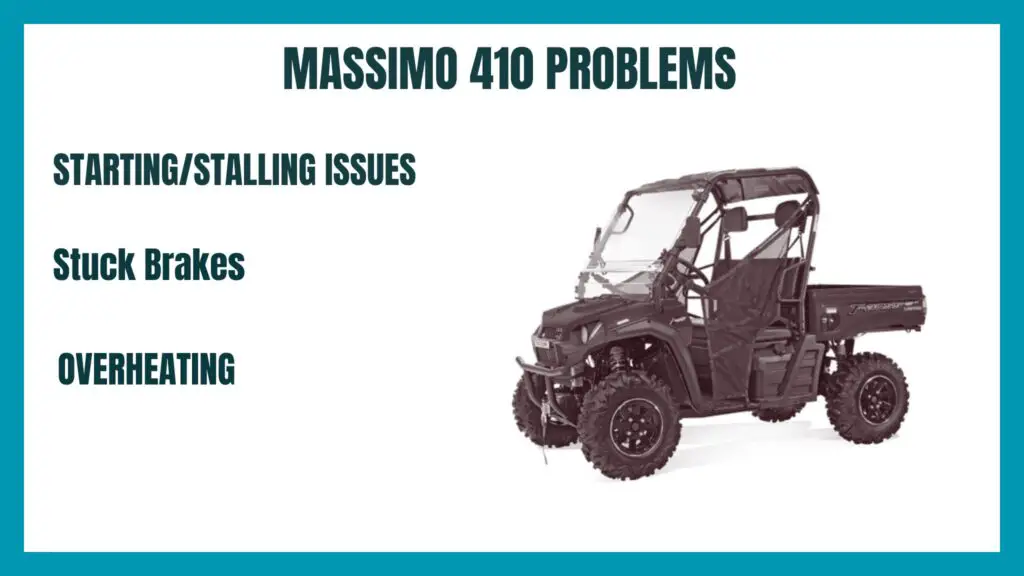
Multiple users have mentioned that they had problems with starting the Massimo T-boss 410. The starter switch has negative reviews, and most of the people have suggested replacing the starter switch. The less frequent issues with Massimo T-boss 410 include stuck brakes, fuel pump issues, low pressure, misfiring cylinders, and stalling.
How Can I Troubleshoot And Fix T-Boss 410 Issues Like No-Start Or Stalling?
Issues like no-start or stalling can be associated with issues of the fuel system, compression system and ignition system. I checked the Massimo T-boss 410 service manual, which had a section for troubleshooting of starting failure / hard starting of Massimo t-boss 410 UTV. To fix T-Boss 410 issues like no-start or stalling, you should check for and find the faulty part and repair or replace it with a new one. Here I have listed all the causes and parts that might be faulty and causing your t-boss 410 not to start. If issues are due to reasons like clogged filters or, fuel tank, then you can do a simple cleanup, replace the fuel to make it work. Most of the time, the issue is due to a faulty switch, you can do a replacement of the switch. Worn-out parts can be upgraded with parts that are available on Massimo official website or any other portal/dealership.
How to Troubleshoot Massimo T-Boss No-start or Stalling Issues?
The fuel system issues leading to starting failure or hard starting of Massimo t-boss 410 can occur due to the following reasons.
- Empty/Clogged fuel tank
- Clogged fuel pump
- Deteriorated fuel/ presence of foreign materials or water in fuel
- Incorrect fuel pressure
- Auto choke due to starter plunger malfunction or wax malfunction
- Throttle body connect not good
- Clogged air cleaner
The compression system issues leading to starting failure or hard starting of Massimo t-boss 410 can occur due to the following reasons.
- Loose spark plug
- Loose cylinder head
- Broken cylinder head gasket
- Broken cylinder gasket
- Worn, damaged or seized cylinder
- Improperly adjusted valve clearance
- Improperly sealed valve
- Improperly contacted
- valve and vale seat
- Improper valve timing
- Worn piston
- Broken valve spring
- Worn fatigued or broken piston ring Seized valve
- Seized piston ring
- Seized or damaged piston
The ignition system issues leading to starting failure or hard starting of Massimo t-boss 410 can occur due to following reasons.
- Improperly charged battery
- Faulty battery
- Burnt out fuse, improper fuse connection
- Improper plug gap
- Worn electrodes
- Wire between terminals broken
- Improper heat range
- Faulty spark plug cap
- Broken or shorted primary/secondary coil
- Faulty high tension cord
- Broken ignition coil body
- Faulty ignitor unit
- Faulty pick up coil
- Broken magneto woodruff key
- Faulty main switch
- Faulty brake switch
- Faulty main switch
- Faulty brake switch
Are There Reliability Concerns Or Recalls For The T-Boss 410?
There are no major reliability concerns about the Massimo t-boss 410 and neither any reported recalls to date. The users have reported that Massimo t-boss is a reliable vehicle with standard features and works well in real world conditions. However, some users had issues with the new model and the old models. Overall, the Massimo T-boss 410 is a reliable UTV as far as user feedback is concerned; however long-term durability is subject to the maintenance and use case of the vehicle.
How Do You Perform An Oil Change On The Massimo T-Boss 410?
To perform the Massimo t-boss 410 oil change, you have to drain the old oil, replace the oil filter, reinstall the drain plug, and then add new oil. The correct procedure for the Massimo t-boss 410 oil change is as follows.
- Drain the Old Oil
Warm the engine for 2-3 minutes, then turn it off. Place a drain pan under the crankcase, then find the Massimo t-boss 410 drain plug location, which is a bolt on the underside, and loosen the drain plug with a wrench. Remove the plug fully by hand, and let the oil drain completely.
- Replace the Oil Filter
To do the oil filter replacement, find the oil filter under the seat. To do it remove the seat and possibly a plastic cover. Use an oil filter wrench to turn it counterclockwise and remove it. You can see some oil drip. Rub a thin layer of new oil on the rubber gasket of the new filter, then screw it on by hand until snug. Tighten the screw.
- Reinstall the Drain Plug
Clean the drain plug with a rag and check its washer or O-ring. Thread it back into the crankcase, then tighten securely with the wrench.
- Add New Oil and Final Checks
After that, remove the dipstick/fill cap (side or top of engine), insert a funnel, and pour in the required quantity, i.e., ~1.5 quarts of 10W-40 synthetic oil, slowly. Check the dipstick (oil should be between min/max marks) and add more if needed. Replace the cap, run the engine for 1-2 minutes to check for leaks at the plug and filter, and then recheck the level after shutting off. Dispose of old oil at a recycling center.
Do the oil replacement as per maintenance schedule as mentioned in the service manual.
How Do I Fix Clutch Slipping On My T-Boss 410?
To fix clutch slipping in the Massimo T-boss 410, remove and replace the worn-out parts of the clutch, such as the spring, clutch shoe. The clutch slipping in T-Boss 410 can occur due to incorrect clutch weight spring position, CVT system, incorrect primary clutch, incorrect engine mount.
There are multiple reasons for clutch slipping issue with Massimo T-Boss 410 which includes
- Worn out clutch weight spring,
- Loose clutch weight spring
- Worn or damaged clutch shoe
- Seized primary sliding sheave
- Uncorrect primary clutch
- Uncorrect engine mount
Another quick fix for this problem is to correct the position of the clutch mount, oiling the clutch sliding sheave.
Where Can I Find Parts and Accessories for The T-Boss 410?
Massimo T-boss 410 UTV accessories can be found on Massimo motor sports official site. To find accessories for Massimo T-Boss 410, go to Massimo motor sports official website, then click the accessories section and you can find Massimo t-boss 410 parts and accessories. The other platforms that provide the Massimo T-boss 410 parts and accessories are Amazon, eBay, Parts Boss, Tractor Supply, Walmart.
What Models Are Similar To The Massimo T-Boss 410?
The other similar models in comparison to the Massimo T-boss 410 from Massimo are Massimo t-boss 550, Massimo t-boss 1000, Massimo t-boss 750, Massimo t-boss 560, Massimo buck 450, Massimo MSU 800. Here are the models similar to Massimo T-boss 410 in the series.
- Massimo t-boss 550
- Massimo t-boss 1000
- Massimo t-boss 750
- Massimo t-boss 560
- Massimo buck 450
- Massimo MSU 800
How Does The T-Boss 410 Compare To Other UTVs In Its Class?
The T-Boss 410 is the most affordable in comparison to other UTVs in the class. It is best for budget users needing a UTV for light tasks. The Buck 450 is close for cost. The T-Boss 550 offers the best value for a mix of power and price, which is great for moderate jobs. The T-Boss 560 is similar but costly. The T-Boss 750 is good for heavier work, while the T-Boss 1000 is the best for tough, heavy-duty tasks despite its high cost. The MSU 800 seems decent for general use.
After comparison with other UTVs, following is the guide on which UTV is good for which purpose.
- Most Affordable: T-Boss 410
- Best Value: T-Boss 550
- Best for Heavy Work: T-Boss 1000
- Light Tasks: T-Boss 410 or Buck 450
- Mid-Range Tasks: T-Boss 550, 560, or MSU 800
Here is a detailed comparison of massimo T-boss 410 with the other models in the class.
| Model | Engine | Suspension | Towing Capacity | Price (MSRP) |
| T-Boss 550 | 493 cc; 33 HP | Double A-Arm (front & rear with adjustable preload) | 1,200 lbs | $9999.99 |
| T-Boss 560 | 493 cc; 33 HP | Double A-Arm (front & rear with adjustable preload) | 1,200 lbs | $10,999.00 |
| T-Boss 750 | 694.6 cc; 42 HP | Double A-Arm (front & rear with adjustable preload) | 1,500 lbs | – |
| T-Boss 1000 | 997 cc 83 HP | Double A-Arm (front & rear with adjustable preload) | 2,500 lbs | $17,999.00 |
| Buck 450 | 352 cc; 25 HP | Twin-A Arm Independent (front & rear) | – | $9,499.99 |
| MSU 800 | 500 cc; ~35 HP | Independent suspension | – | – |
Which Massimo Side-By-Sides Are Closest In Features To The T-Boss 410?
The closest Massimo side-by-side to the features of T-Boss 410 is T-boss 410X Golf. The other closest options are the T-Boss 410X Golf, the T-Boss 550, the T-Boss 560, and the Buck 450. These are the detailed comparisons of the Massimo UTV specs.
| Model | Engine (cc/HP) | Towing Capacity (lbs) | Ground Clearance (in) |
| T-Boss 410 | 352 / 25.5 | 1000 | 9.75 |
| T-Boss 410X Golf | 352 / 25.5 | 1000 (likely) | 9.75 |
| T-Boss 550 | 493 / 33 | 1200 | 9.25 |
| T-Boss 560 | 493 / 33 | 1200 | 9.25 |
| Buck 450 | ~450 / ~25 | Not specified | Not specified |
Conclusion:
The Massimo T-Boss 410 UTV is a budget-friendly option. Its key features include selectable 4WD, a 3000 lb winch, a diamond-plated dump bed, LED lights, and hydraulic disc brakes, making it a versatile choice for casual users. It is good for hobby farming, hauling debris, and moving firewood. Still, it struggles with heavy workloads or extreme conditions, with common issues such as poor gear shifting, overheating, and warranty problems reported in Massimo T-Boss 410 UTV reviews. Customer opinions from platforms like Tractor Supply, Amazon, and Massimo T-Boss 410 review Reddit threads are mixed; owners praise its affordability and capabilities but often criticize its reliability, as per Massimo T-Boss 410 review 2020 and 2022 feedback. Costing $10,000 and $12,000, it’s an affordable alternative to pricier competitors. Ultimately, the Massimo T-Boss 410 EFI 4WD UTV is worth it for light-duty needs with an affordable budget.
The T-Boss 410 is all about off-road excitement! Want to compare? Discover the Massimo T Boss 550 or the more powerful Massimo T Boss 750.
Subscribe for Our Latest Posts! Thank you!
